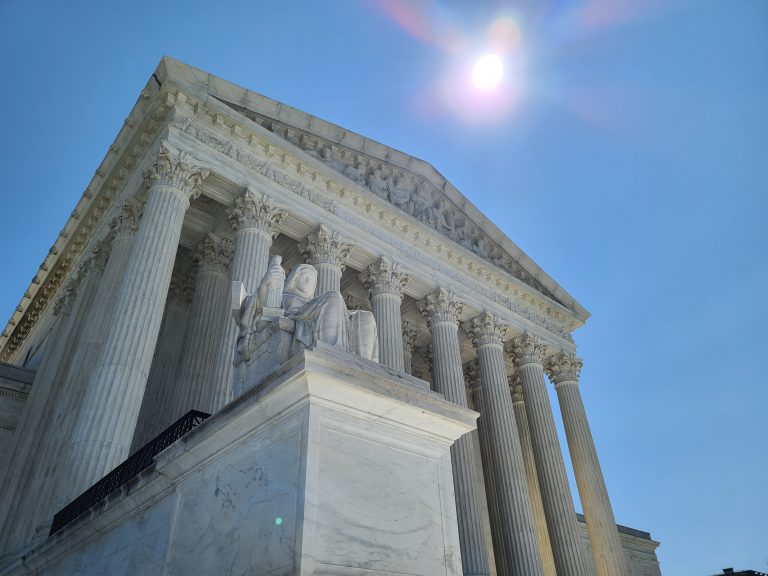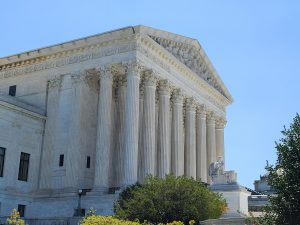The nation’s highest court is set to decide a new Second Amendment case, but how the justices might come down is murky at best.
A collection of experts from across the ideological spectrum who have spent decades studying the Second Amendment and American gun laws told The Reload United States v. Rahimi presents a unique challenge for the Court that will likely flush out its new test for gun cases. But they were less confident about the direction the justices might take or the conclusion they might arrive at.
“It is still too early to tell what the Supreme Court will do in Rahimi,” George Mason University professor Robert Leider, who writes about the Second Amendment and teaches at the Antonin Scalia Law School, said.
Rahimi will be the first gun case the Supreme Court takes up since it handed down a new Second Amendment test in last year’s New York State Rifle and Pistol Association v. Bruen. It is an appeal of a Fifth Circuit panel’s ruling that found the federal ban on those subject to domestic violence restraining orders possessing guns was unconstitutional under the Bruen test. It stems from a case against a Texas man who pled guilty to violating a restraining order his child’s mother had against him over accusations he assaulted her when police found he had guns in his home. The police were able to search his home and find the guns because he is also accused of carrying out multiple shootings unrelated to the situation with his ex-girlfriend.
“Doubtless, 18 U.S.C. § 922(g)(8) embodies salutary policy goals meant to protect vulnerable people in our society,” Judge Cory T. Wilson wrote for the panel. “Weighing those policy goals’ merits through the sort of means-end scrutiny our prior precedent indulged, we previously concluded that the societal benefits of § 922(g)(8) outweighed its burden on Rahimi’s Second Amendment rights. But Bruen forecloses any such analysis in favor of a historical analogical inquiry into the scope of the allowable burden on the Second Amendment right. Through that lens, we conclude that § 922(g)(8) ‘s ban on possession of firearms is an ‘outlier that our ancestors would never have accepted.’ Therefore, the statute is unconstitutional, and Rahimi’s conviction under that statute must be vacated.”
The Department of Justice (DOJ) decided to skip appealing to the full Fifth Circuit and head straight to the Supreme Court, which agreed to take up the case late last month. All of the experts who spoke with The Reload agreed that move was a potentially-smart piece of strategic litigating by Attorney General Merrick Garland (D.) and the DOJ.
Adam Winkler, a UCLA law professor and author of Gunfight: The Battle over the Right to Bear Arms in America, argued Rahimi was an “absolutely necessary” case for the Court to take up. He said the justices need to provide further guidance on how to do the Bruen test, if not eliminate it outright, as gun-control activists have pushed for.
“The Bruen case wreaked havoc in the lower courts,” he said. “Lower courts have been really struggling, trying to figure out how to apply the history and tradition of cast test to a suite of gun laws that, in truth, just don’t have much relationship with the gun laws of the 1700s and 1800s. So, we’ve seen a wide number of laws struck down since Bruen was decided. And I think the kinds of laws that have been struck down have been surprising. I don’t think anyone in the gun space would have been really surprised had the Court struck down bans on assault weapons or high capacity magazines, laws that are kind of outlier laws; they’re not really adopted in very many states. But for a court to strike down the restriction on guns to domestic abusers under a restraining order is the kind of thing that almost assures that the Supreme Court is going to step back in.”
And he said the charges leveled against Mr. Rahimi make his a particularly bad test case for gun-rights advocates.
“If the court is going to step in and clarify, I think the Rahimi case is the best case for gun safety advocates to go to the Supreme Court,” Winkler said. “There is no less sympathetic person in the world than a domestic abuser.”
Mark W. Smith, a former law professor and author of First They Came for the Gun Owners: The Campaign to Disarm You and Take Your Freedoms, noted DOJ skipped over appeals to rulings against prohibitions it uses far more often, such as the felon-in-possession ban the Third Circuit recently cast doubt on, to elevate a case over a charge it rarely uses in practice.
“Here’s the interesting thing,” he said. “Did Merrick Garland and the Department of Justice for Joe Biden laser focus and try to get the Supreme Court to hear a 922 G1 case involving felons in possession of firearms, the bread and butter routine thing that US Attorney’s Offices see every day in America? They did not. What did they do? Instead, they laser-focused on this Rahimi case.”
But he called the maneuvering a “gamble.”
“DOJ thinks that the fact that Mr. Rahimi allegedly is a bad guy involved in five shootings, that’s going to somehow sway the Supreme Court to ignore the law, to ignore the Constitution, and to somehow bend over backwards to find a way to make Mr. Rahimi lose and in the process of ensuring that Mr. Rahimi loses by extension screw up in some way the Bruen methodology,” Smith said. “Remember, the Supreme Court did give us Bruen a year ago. And, if Merrick Garland thinks they’re going to somehow screw that up and do an about-face, I don’t think that’s going to happen.”
Others remained less confident, though. Josh Blackman, a Cato Institute scholar and a South Texas College of Law professor who teaches constitutional law, said the case is “the last possible case I would pick” to follow up Bruen.
“I can see why the Solicitor General skipped asking the Fifth Circuit for rehearing en banc and went straight to the Supreme Court,” he said. “If I am the Biden administration, this is the best case I could ask for. It will force Chief Justice Roberts and Justice Kavanaugh to let someone accused of domestic violence keep a firearm. I think that is unlikely. A majority of the Court may end up limiting Bruen, or at least creating a carveout for people with certain types of criminal offenses.”
That’s despite the fact that he, and several of the other experts, believe the restraining order prohibition will have a hard time meeting the history and tradition standard laid out in Bruen–at least as many courts currently understand the practically-newborn standard.
“As an originalist matter, under the Bruen framework, there is not a clear ‘analog’ between the domestic violence restraining order and past laws,” Blackman said. “This fact is unsurprising because when the Second Amendment was ratified, domestic violence, as we know it today, was not a legal concept. So following Bruen does support the Fifth CIrcuit’s decision.”
Winkler agreed but argued that was evidence of the Bruen test’s “foolishness.”
“Well, of course, we didn’t have laws restricting domestic abusers from possessing firearms in the 1700s and 1800s,” he said. “Domestic abuse wasn’t really illegal. It was allowed. So, domestic abuse kind of highlights the ways in which society has fundamentally changed from the 1700s and 1800s. And our understanding of what violence is and who violent people are has changed.”
Andrew Willinger, executive director of Duke University’s Center for Firearms Law, also said there aren’t exact historical analogues from the founding era for a domestic violence restraining order leading to a ban on gun ownership. But he argued that isn’t really what the Bruen standard requires under the circumstances at play in Rahimi.
“In general, I think Rahimi presents the question of what happens when analogizing to history ‘runs out,’ or is incapable of producing a straightforward answer because the concerns motivating a modern law simply weren’t present around the time of the Founding,” he said. “I read the Fifth Circuit’s decision as holding that the Bruen test defaults to unconstitutionality in these circumstances—so, no matter the reason that certain laws weren’t present at the time of the Founding, that fact means the modern law violates the Second Amendment. I think the panel erred when it failed to conduct the ‘more nuanced approach’ that Bruen identified for ‘cases implicating unprecedented societal concerns.'”
He isn’t alone in thinking the Court will reverse the Fifth Circuit’s ruling either. Winkler said it’s most likely “you see a majority of the court watering down the Bruen test.” Leider argued there’s a substantial chance the Court upholds the law, and the “open question is how narrow or broad its ruling will be” because Chief Justice John Roberts generally works towards broad consensus rulings on controversial topics, which implies a more narrow ruling could be the result.
“The legal question in this case is a narrow one: whether the Second Amendment allows the federal government to prohibit the possession of firearms by those under domestic violence restraining orders,” “Of the factors that may trigger a ban on gun possession, this one is the most tailored. It only applies when the restraining order is in effect. And at least in most states, in theory, the restraining order should not issue unless the person is a danger to a family member or has previously assaulted, battered, or stalked a family member. There is a strong correlation between those who have previously engaged in family violence and those who ultimately murder their family members.”
He said that stood in contrast to laws against felons owning guns because what constitutes a felony has ballooned over the years, with many non-violent crimes landing offenders like Martha Stewart lifetime gun bans.
“So, of the various prohibiting criteria, the domestic violence restraining order ban may be the most defensible,” Leider said. “Historically, the court system has also been involved in the prevention of crimes. There is a tradition of requiring defendants to post a surety to keep the peace when there is probable cause to believe that they are a danger to others. At common law, a spouse could seek sureties of the peace against the other spouse, and the common law permitted such actions even during times in history when spouses could not generally sue each other.”
Justice Amy Coney Barrett’s dissent in 2019’s Kanter v. Barr could play a significant role if the Court does decide to rework its Second Amendment test, Willinger argued. He said he could see six justices going along with the reasoning.
“I expect the Court to clarify that a more nuanced approach applies and, most likely, to adopt Justice Barrett’s position in Kanter that the general historical principle that dangerous individuals may be disarmed supports the domestic violence restraining order law under the nuanced approach,” he said. “I read Justice Barrett’s dissent in Kanter to say that laws such as 922(g)(8) are constitutional because history supports prohibitions based ‘on present-day judgments about categories of people whose possession of guns would endanger the public safety.'”
Although, Winkler said that standard could run into its own problems because its foundation is laid primarily on bigotted gun bans.
“The court could say, ‘This is analogous to laws banning dangerous people like Blacks or Native Americans from possessing firearms,'” he said. “But I think that’s kind of an uncomfortable opinion to write. Why? Because it’s clear that Blacks and Native Americans were not dangerous people and that was totally based on falsehood and racism. The ban on domestic abusers, it’s not based on falsehood but on very clear data that show that domestic abusers with firearms are the most dangerous demographic to have firearms in the world.”
Still, there was broad agreement that the case isn’t a sure thing. Winkler said while it’s “the best-case scenario for gun safety advocates,” it’s not “a slam dunk.” Smith called it “very risky” for gun-control advocates.
“It may work; it may somehow undercut the Bruen methodology,” he said. “But, boy, it may backfire entirely and allow for the Supreme Court to clean up a lot of these open questions we’ve seen in the last year in these various cases across the country and fix it up and strengthen the Bruen methodology. And I could see that happening just as easily as it going the other way.”
A few experts also raised the possibility the Court could take up another case in the same vein as Rahimi. Last month, in Range v. AG, the Third Circuit Court of Appeals found the federal law prohibiting a non-violent felon from owning guns violates his Second Amendment rights. Willinger said if the Court adopts Barrett’s reasoning from Kanter, that would imply a good chance a case like Range would be next on its docket. Leider and Smith both agreed.
“I can see a situation where the Supreme Court grants cert later this year to the Range case and decides the Range case and the Rahimi case,” Smith said. “I could see the Range case resolving the substantive Second Amendment question, while the Rahimi case may focus on the procedural process by which the government must follow to take away Second Amendment substantive rights.”
In the end, despite the difficulty of forecasting what the justices might do, the experts largely agreed the Court is unlikely to enact sweeping changes to how it handles gun cases so soon after handing down that test. It could tweak or rework parts of its application, but a total redo is probably not in the works.
“I would be surprised to see the Court issue a broad decision clarifying other aspects of the Bruen test because I think the justices likely disagree in fundamental ways about questions such as the extent to which lower courts should rely on the adversarial process for historical inquiries, the proper level of generality to use when looking at history in other areas of Second Amendment law such as sensitive places and assault weapons bans, and so on,” Willinger said.
One thing is for sure, though.
“Regardless of how the Supreme Court decides the case, everyone will be pouring over every word in the opinion,” Leider said.






